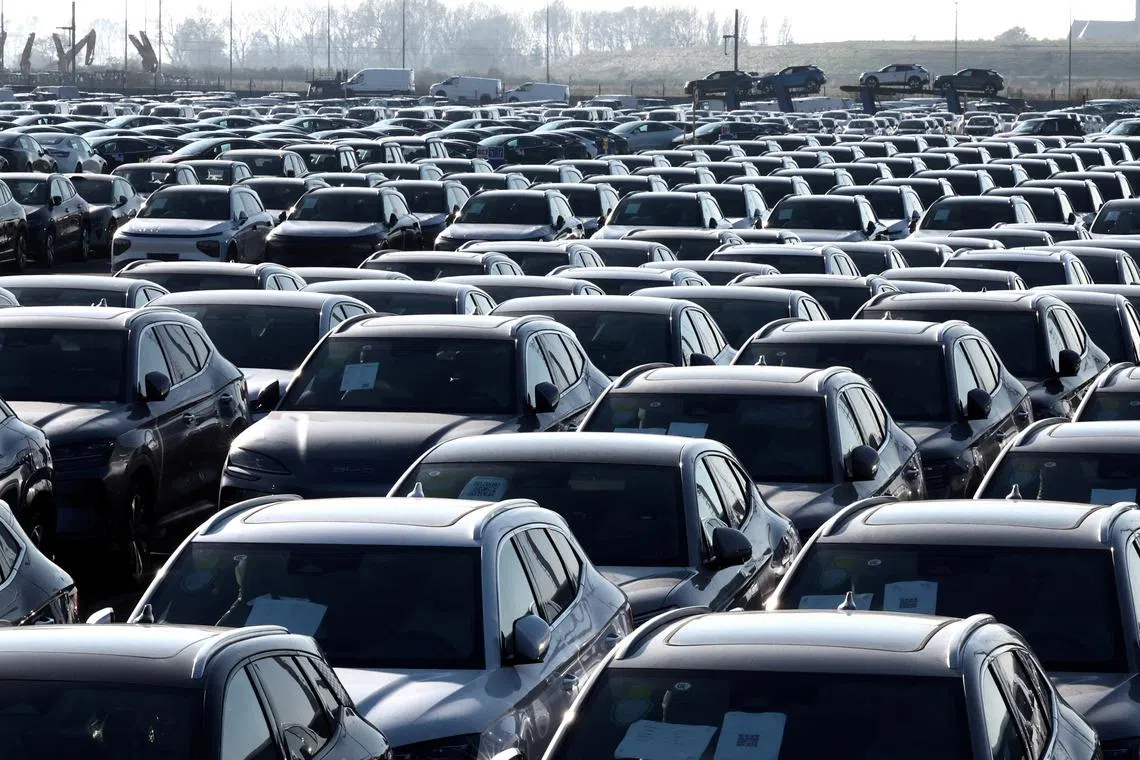EU imposes extra tariffs of up to 35% on China EVs, risking Beijing’s backlash
Sign up now: Get ST's newsletters delivered to your inbox

The new European Union tariffs will come on top of the current 10 per cent tax on imports of EVs from China.
PHOTO: REUTERS
Follow topic:
BEIJING – China on Oct 30 said it did not “agree with or accept” hefty new European Union tariffs on Chinese-made electric vehicles (EVs) after an anti-subsidy probe concluded that Beijing’s support undercut European automakers.
“China does not agree with or accept the ruling, and has filed a complaint under the WTO (World Trade Organisation) dispute settlement mechanism,” a spokesperson for Beijing’s Commerce Ministry said.
“China will... take all necessary measures to firmly protect the legitimate rights and interests of Chinese companies,” added the spokesperson.
“We also noticed that the EU side indicated it would continue to negotiate with China on price commitments,” said the spokesperson, adding that Beijing hoped to find a “solution acceptable to both sides as soon as possible to avoid escalating trade friction”.
China launched its own probes in 2024 into imports of EU brandy, dairy and pork products in apparent retaliation.
The EU on Oct 29 announced that it would increase tariffs on Chinese-built EVs
Once these tariffs come into effect, they will be definitive and last for five years.
The extra duties also apply, at various rates, to vehicles made in China by foreign groups such as Tesla, which faces a tariff of 7.8 per cent.
Chinese car giant Geely – one of the country’s largest sellers of EVs – faces an extra duty of 18.8 per cent, while SAIC Motor will be hit with the highest at 35.3 per cent.
The duties will come on top of the current 10 per cent tax on imports of EVs from China.
The extra tariffs were formally approved and published in the EU’s Official Journal on Oct 29, meaning they took effect on Oct 30.
The European Commission, which oversees EU trade policy, has said tariffs are required to counter what it says are unfair state subsidies, including preferential financing and grants as well as land, batteries and raw materials at below market prices.
It says China’s spare production capacity of three million EVs a year is twice the size of the EU market. Given 100 per cent tariffs in the US and Canada, the most obvious outlet for those EVs is Europe.
Trade tensions between China and the EU are not limited to electric cars, with Brussels also investigating Chinese subsidies for solar panels and wind turbines.
European automakers are grappling with an influx of lower-cost EVs from Chinese rivals. The European Commission estimates that Chinese brands’ share of the EU market has risen to 8 per cent from below 1 per cent in 2019, and could reach 15 per cent in 2025. It says prices are typically 20 per cent below those of EU-made models.
The EU’s stance towards Beijing has hardened in the last five years. It views China as a potential partner in some areas, but also as a competitor and a systemic rival.
However, EU members are not united on EV tariffs.
Germany, the EU’s biggest economy and major car producer, opposed tariffs in a vote in October, in which 10 EU members backed them, five voted against and 12 abstained.
Germany’s Economy Ministry said on Oct 29 that Berlin supported ongoing EU negotiations with China, and hoped for a diplomatic resolution to mitigate trade tensions while protecting EU industry.
German carmakers have heavily criticised the EU measures, aware that possible higher Chinese import duties on large-engined petrol vehicles would hit them hardest.
The measures come as thousands of German industrial workers, including at the carmakers, strike for higher wages, with Volkswagen possibly about to announce shutting plants on home soil for the first time in its 87-year history.
Hungarian Prime Minister Viktor Orban said the EU was headed for an “economic cold war” with China.
However, French car association PFA has welcomed the duties, adding that it backed free trade as long as it was fair.
It remains to be seen what impact tariffs will have on consumer prices. Some producers may be able to absorb them, at least partially.
In the first nine months of 2024, China’s EV exports to the EU were down 7 per cent from a year earlier, but they have surged by more than a third in August and September, ahead of the tariffs, data from the China Passenger Car Association showed. REUTERS, AFP

